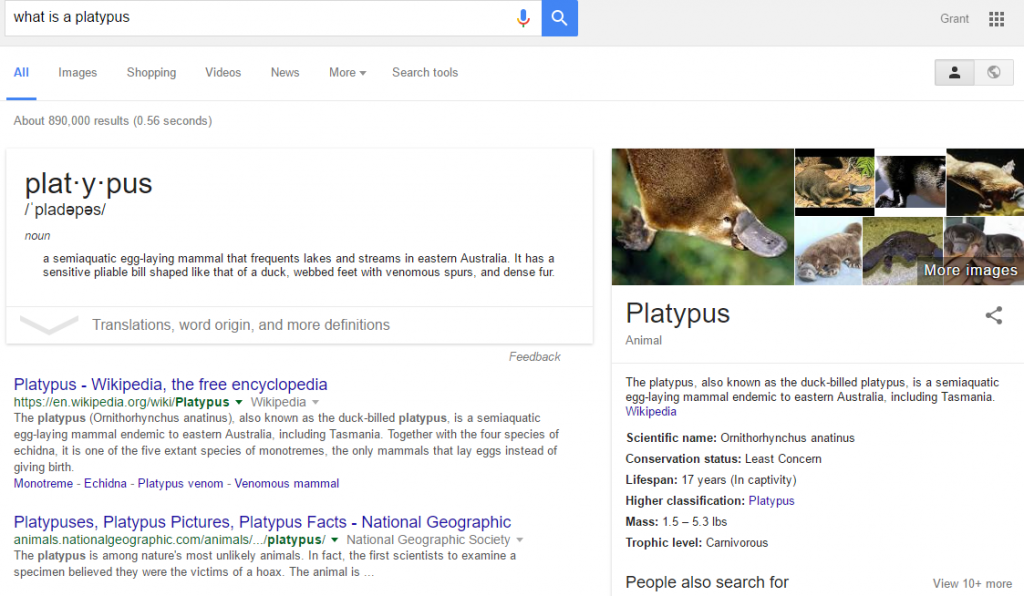In a previous blog post, we went over the basics of content optimization – what…

Why Isn’t My Website Ranking?
The SERPs are Dead; Long Live the SERPs
At their core, search engines are answer machines. Where once your search engine would provide results directing you to a potential list of answers, search engines today provide you with the answer themselves without the need to click through to a site. To add to this, often that answer comes in more than one format which takes up screen real estate above the fold, that area visible before you scroll down. Now, even if you’ve followed the tenants of organic search engine optimization (SEO) and rank first, your site may not appear above the fold.
The dawn of the search engine and its use once involved a simple process – enter a word in the search bar, get results that related to the search word. Pretty straight forward. If your website had keywords embedded in the site’s copy or its code, and was optimized to be discovered by an amorphous search genie, that site had a chance of ranking high on the Search Engine Results Page (SERP).
This simple search function spawned a multi-billion industry that didn’t exist 25 years ago – Search Engine Optimization (SEO). The art of SEO has evolved into a science involving complex textual relationships based on equations that most wouldn’t recognize unless they were a mathematician. And, there are multiple components that must be considered to rank high on SERP.
In the 90s when search engines first came in to play there were a number of choices like Excite, AltaVista, Webcrawler, and Yahoo Directories. Today, the de facto search engine is Google which has triple the monthly visitors of the next largest engines, Bing and Yahoo. And, arguably, Google largely dictates the tempo and direction of online search methodologies.
In the past, organic results were the first thing we saw on the page, those natural results generated based on a series of metrics that determines their relevance to the searched term or sentence. Now, often your screen’s real estate above the fold will include sponsored listings, a Knowledge Graph, Quick Answer, map, video or news results.
Today you complete with a number of new features to rank above the fold on page one. The Quick Answer is popular one. Let’s say that you are a platypus marine biologist trying to capture attention to the plight of the unique creature and want people to come to your website that offers information on and takes donations for platypus survival. Type in “what is a platypus” and the first thing you will see in your results is a box with the definition of platypus. If someone is marketing and selling these duck-billed beaver like wonder as stuffed animals you may even see a paid listing under the Quick Answer box with a little box that reads “Ad” next to the listing (an Adwords feature). On the right side of the page you will likely see what is called a Knowledge Graph. This feature provides pictures of, facts about, and types of platypuses. Your screen is filled with a wealth of information. If there is a brew pub in your city called the Platypus Bar a map identifying the pub’s location may be the first think listed on the SERP. In short, your site championing this mammal may not be visible above the fold and your efforts to raise money for a platypus sanctuary may go unnoticed.
So, what does it take to get listed in that prime screen real estate?
The behind the scenes of a single search today involves a process that includes a semantic network of over 570 million objects and more than 18 billion facts about the relationships between different objects that are used to understand the meaning of the keywords, phrase or sentence entered in the search bar, and that’s just the computational figures behind the Knowledge Graph.
In order to assure that your company, product, or brand is seen throughout the web, you can no longer rank first organically and call it a day. You must tailor build the content on your site to better rank in Quick Answers. All relevant information must be wrapped in structured data in order to make sure the Knowledge Graph displays the most accurate data available. Your Local SEO must be strong, reinforced with geographical based Keywords in order to rank well in Maps. An ever evolving Pay-Per-Click campaign should be developed and implemented in order dominate as many search queries as possible. Proper Social Media profiles should be built, maintained, and optimized to further increase your web visibility and increase your odds of a conversion. If you sell products online, your E-Commerce SEO needs to be on point to help products themselves appear in the SERPs and Google Shopping alike.
Today, it takes a team of professionals to ensure you are visible above the fold in search engines. Being number one is no longer good enough. Your brand must be Michael Phelps and have a gold medal in everything in order to compete in the digital marketing landscape.



